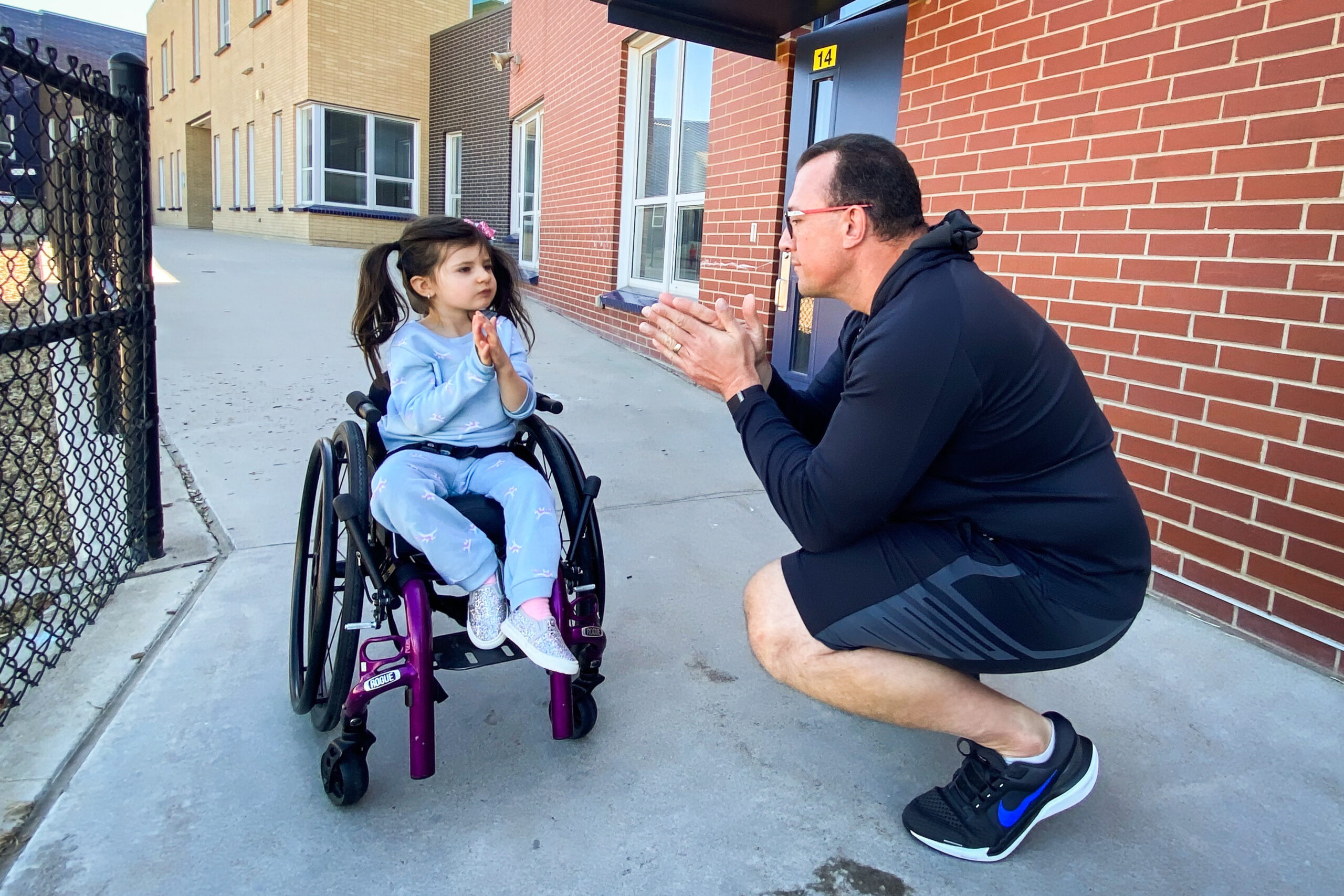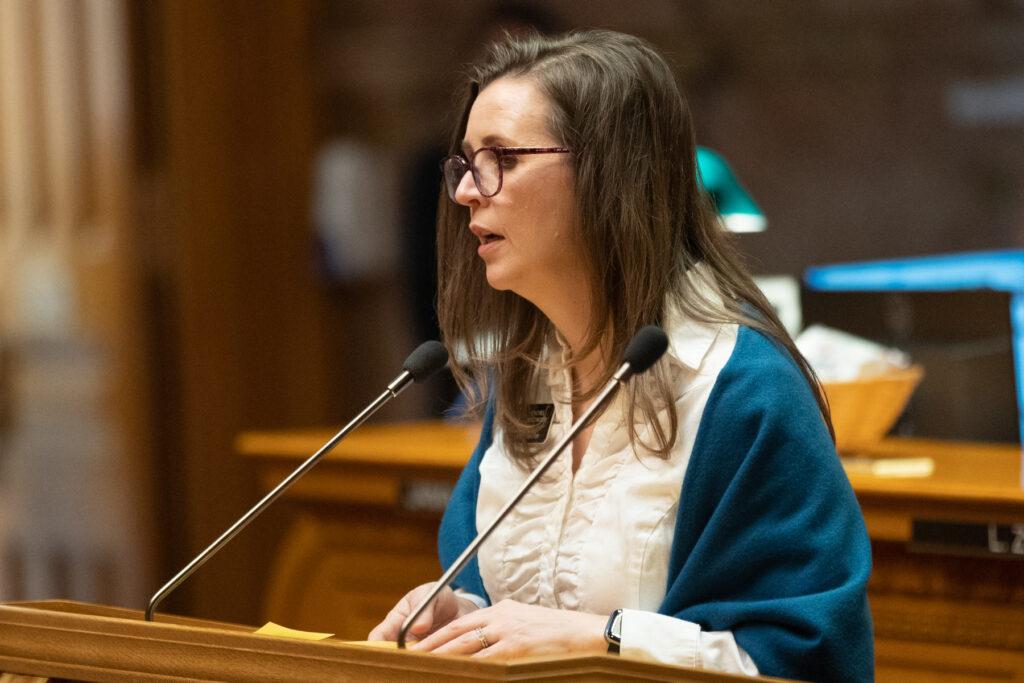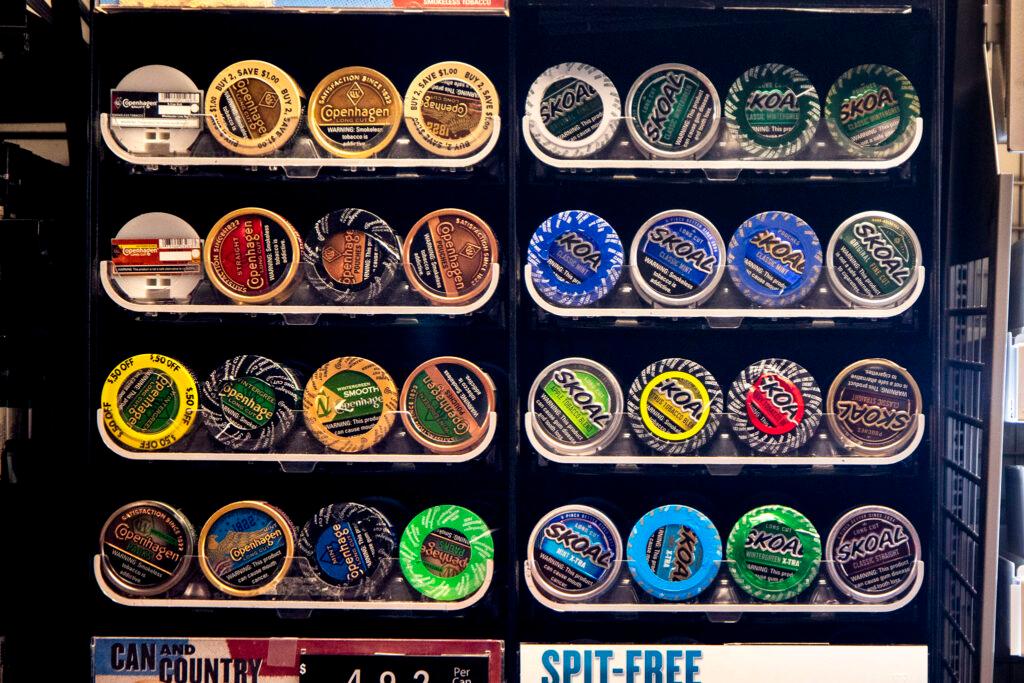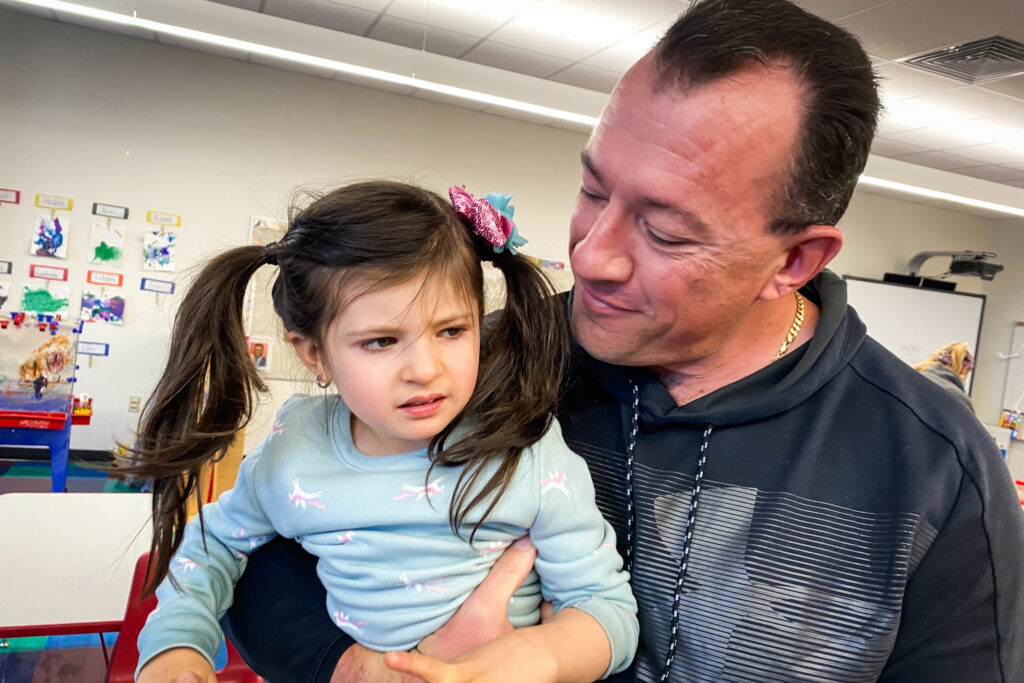
Editor’s Note: CPR News has spent months talking with teenagers, parents, doctors, advocates, political figures. We’ve looked through once-secret internal industry documents released by tobacco companies and listened to many hours of city council and legislative debate. What we found is that the conversation about tobacco products, especially flavored ones like menthol, is not only about nicotine’s deadly effects or the impact on local economies. It’s about ethics, optics and equity.
At the Isabella Bird Community School in Denver, under a bluebird sky, preschoolers rumble around a playground as dad John Opp arrives to pick up his 4-year-old daughter, Giuliana.
She’s been diagnosed with autism, something Opp calls medical mystery.
“Every genetic test has come back normal, but she doesn't walk and is still nonverbal,” he said, adding that Giuliana is incredibly social, with a love of sign language and horse therapy.
Opp’s family relies on Colorado’s new universal pre-k program to help cover her tuition at Isabella Bird, where she gets great support from teachers and therapists.
“It's kind of scary to think how much farther behind she would be if she didn't have this,” he said.
He said the program helped him afford preschool, likely saving his family thousands of dollars.
“I got a full enough plate as it is,” Opp said. “I'd rather not spend time worrying about figuring out what the cost would be. I'm just grateful that we've got some public funding and the more we can get, the better for her.”
Colorado voters in 2020 approved raising hundreds of millions of dollars to establish the program, which currently enrolls more than 40,000 kids. And the money comes from a perhaps surprising and seemingly unrelated source — taxes on cigarettes, vapes and other tobacco and nicotine products.
While the original proposal passed by a wide margin, voters are being asked to weigh in again this fall, this time on whether to allow the state to keep the full proceeds of the tax.
Vaping sales, in particular, have been stronger than analysts originally anticipated, with the result that Colorado has brought in $23.65 million more than voters were originally told it would in the state’s official voter guide. Rules in the state constitution say when that happens, it’s up to voters to decide whether the state gets to keep the extra money or must refund it, in this case to tobacco wholesalers and distributors. That question appears on fall ballots as Proposition II.
How a sin tax became linked to universal preschool
So something that’s bad for people’s health is now helping pay for something that’s good for children’s development.
Critics of this funding model argue that if Colorado wants to prioritize early childhood education, it should find room for it in the general budget, instead of putting the cost on people addicted to tobacco and nicotine.
Even some supporters of the original tax measure from 2020 are uncomfortable with what they see as a Faustian bargain.
“I think that is the danger and the peril of entering this more transactional a la carte approach to funding government,” Scott Wasserman, president of the Bell Policy Center, a progressive political think tank in Denver.
Bell Policy backed the original measure and is in favor of Prop. II this year. Wasserman blames the Taxpayer’s Bill of Rights, which says voters must approve all new taxes — something that so far, they’ve only been willing to do with so-called sin taxes.
“You have to come up with enticing hooks, industries that people think are fair to tax more or sins that are fair to tax more with very specific services that people care about,” he said. “It is very important to come up with an attractive hook.”
Policymakers have increasingly, and perhaps grudgingly, leaned on those attractive hooks to fund other programs. Marijuana taxes support school construction. Gaming revenues go to the community college system.
“I really resent the connection to this form of revenue source, to be honest. I don't like it, but it is what it is,” said state budget committee chair state Sen. Rachel Zenzinger.

The Arvada Democrat said she voted against using tobacco revenues to pay for universal pre-K the first time it was proposed in 2019 because “I felt like it was a regressive tax and that there are some things that we should just try and fund out of the general fund.”
However, she came around and voted “reluctantly” to put the idea on the ballot in 2020.
“We do operate under a constrained budget, and we needed a dedicated, new revenue source in order to accomplish our goal of expanding early childhood education,” she said.
Have public health and early childhood education become competing priorities?
So what happens when a health-conscience idea comes runs into policymakers’ other priorities? Colorado watched the answer play out last year, when state lawmakers considered a contentious, heavily lobbied bill to ban flavored tobacco, with the goal of cutting down on youth vaping.
At the time, Gov. Jared Polis told Colorado Matters host Ryan Warner he opposed the statewide ban, saying it should be up to local officials.
“Philosophically … I support local control on a wide variety of issues,” the governor said.
Polis insisted his opposition was not because reduced vaping sales could cut into the funding stream for universal preschool. And he noted tobacco and vape taxes also go to support anti-tobacco and addiction recovery programs.
“So it doesn't just go to early childhood (education). It goes to actually reducing tobacco usage,” he said.

House lawmakers easily passed the flavor ban but the bill failed in committee before it could get to the full Senate. One of the decisive votes was cast by Arvada’s Zenzinger.
“I voted against it and I killed it,” she told CPR in an interview this month.
Zenzinger, a teacher who is known as a relatively pro-business Democrat, said her vote was not about protecting dollars for universal preschool. “This was me recognizing that we were coming out of a pandemic and that my business community was suffering,” she said. Owners of vape shops testified the bill would put them out of business.
But opponents of the tobacco flavor ban saw the connection to education funding as a key element in their successful efforts to defeat the bill.
The podcast “Shaping Vaping” from the American Vapor Manufacturers devoted a show last spring to Why Colorado Backed Off a Flavor Ban. One guest: Joe Miklosi, a lobbyist for the vaping industry group Rocky Mountain Smoke Free Alliance, and former Democratic state representative.
Miklosi told listeners that protecting the revenue stream for universal pre-k absolutely drove the outcome of the vote on the tobacco flavor ban.
“Gov. Jared Polis, kind of a moderate Democrat governor of Colorado, really made it known he didn't like this bill, House Bill 1064,” he said.
Passing the statewide ban on flavored tobacco, Miklosi said, would cut into tax revenue “for one of his top three projects, pre-K childcare,” and he noted that Polis was promoting his creation of the popular program as part of his 2022 reelection campaign.
He said the governor is not a huge fan of vaping, but he wanted the “sin tax revenue from what the voters voted on in 2020 and didn't want to see that gutted.”
Nonpartisan state analysists estimated the flavor ban would have reduced the taxes going to pre-k and smoking cessation programs by nearly $20 million annually, about ten percent of what the state collected under Prop EE in its first year.
The back and forth over last year’s flavor ban proposal shows how politics makes for strange bedfellows, said Miklosi.
Contacted recently by CPR, Miklosi wouldn’t provide details about his claim that the governor was protecting money for universal pre-k, but he noted that “many states, including Colorado, use sin taxes to fund programs that the public enjoys, like pre-K school funding.”
When asked to respond to Miklosi’s allegations, a spokesman reiterated that Gov. Polis was motivated by his support for local control.
Still, the episode suggests the ways Big Tobacco — or maybe it’s Big Vape these days — has become entwined with Colorado politics, as the state has come to rely on taxes paid by Coloradans who are themselves hooked on tobacco and nicotine.
“When you have to balance the budget, you've got to make tough choices about where you're going to secure funding sources to support the programs that Coloradans demand,” Miklosi told CPR.
‘Moral ambiguity’
Back at the Isabella Bird School, parent John Opp played with his daughter Giuliana while contemplating the ties between her classroom and Colorado’s smokers and vapers. He said there is some “moral ambiguity” in taxing people’s often unhealthy habits, “but if they're going to do it, can we make it a positive somehow?”
“At the end of the day, I think we're probably not getting rid of addiction and nicotine,” he said. And if there's good that can come out of it, such as helping kids like his daughter and others gain access to greater services, he said he can support it.

One backer of both the universal preschool program and last year’s flavored tobacco ban said he didn’t see conflict between the two.
“If there was a flavor ban tomorrow, I really don't think that it would be that huge of an impact on overall revenue,” due to ongoing consumption of nicotine products and population growth, said Jake Williams, CEO of Healthier Colorado. “I don't think that the universal pre-k program would honestly be all that affected.”
Revenue miscalculation puts tobacco taxes back on the ballot
When voters were first asked to raise tobacco taxes for universal preschool, the state estimated the proposal would bring in $186 million in its first full year. Instead the new taxes raised more than $20 million above the projection.
Why was the original estimate off by so much?
“It was a brand new thing,” said Zenzinger, the state budget committee chair, especially since Colorado had never actually taxed vape products before. “It's just an estimate, and you use trends and you use sort of the context of what's happening in that moment in time to try and project.”
Another possible reason: Coloradans are vaping more than the state anticipated.
“We observed wide fluctuations in consumption of marijuana during and following the pandemic (large increase during the pandemic; large decrease afterward), and nicotine may have followed a similar pattern,” said Gregory Sobetski, the Legislative Council Staff’s chief economist, in an email.
While there is no organized opposition to the idea of Colorado holding on to the extra tax revenue, Republican lawmakers did uniformly vote against putting it on the state ballot. Rep. Anthony Hartsook argued that when the state tells voters a tax will raise a certain amount, it should stick to that.
“I don’t like that sleight of hand,” said Hartsook during a floor debate on the proposal. “I don’t mind if we tell the voters, ‘Hey, we’re going to tax you, are you OK with this?’ and they say ‘yes or no.’ If we say, ‘we’re doing something for schools, yes or no?’ But when we overcollect, what’s to stop us in the future from doing business the same way?”
However, proponents argue the fledgling universal pre-k program needs the funds and are optimistic voters will again strongly support it, as they did in 2020.
“We all as a community have to stand in the gap for providing high quality preschool and childcare to our young children,” said Heidi Heissenbuttel, the CEO at Sewell Child Development Center in Denver. “There was a crisis before the pandemic, it's even more of a crisis now.”









